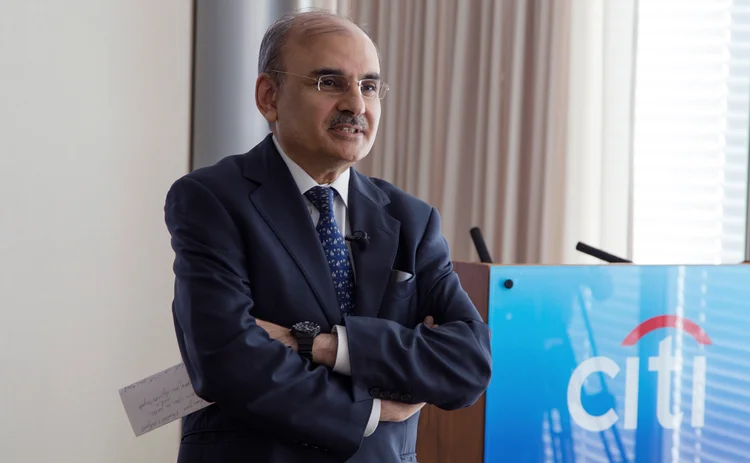
AWARDS Citi takes second place with six wins

Revenues among the world’s largest investment banks from the sales and trading of G10 currencies have been under pressure since the start of 2016, due to rising costs, while the lack of volatility so far this year has resulted in scant trading opportunities.
In G10 foreign exchange, revenues across the Street fell by more than 20% in the third quarter of this year, compared with 2016, according to a report by financial consultancy Coalition.
“If you look at the market today and the businesses in this space, it’s clear there has been a big reduction in global revenue pools. The data is pretty concerning,” says Nadir Mahmud, global head of foreign exchange and local markets at Citi.
Granted, last year saw several exceptional trading events, such as the UK’s vote to leave the European Union and the election of US President Donald Trump, while this year has offered no equivalent. This flatlining of volatility has hit options trading most, followed by spot markets.
Citi, which slipped to second place overall in the 2017 FX Week Best Bank Awards since last year, still showed its might in the currency trading space with six wins across categories: Best Bank for FX for Corporates, Best Bank for Currency Options, Best Bank for FX Forwards, Best Bank for Structured Products, Best Bank for USD/JPY, and Best Bank for FX Research and Strategy.
This is primarily down to three factors: the sheer scale of Citi, which is active in 140 currencies and has bases in 80 countries; its commitment to invest in technology and its electronic platforms, including Velocity, which serves 82,000 institutional clients in more than 130 countries; and its responsiveness to client behaviour.
I can’t forecast what the global revenue pool will be like in 2018, but we have always been and remain fully committed to FX
Nadir Mahmud, Citi
The currency trading giant has reorganised its salesforce over the past 12 months to better reflect the needs of its customers, moving away from regional account management to a more centralised coverage approach, focused on client segments and high-touch versus low-touch businesses.
But Mahmud is mindful of the challenges facing foreign exchange going forward. Regulation has made it more expensive for all market participants to do business, with the cost of capital and balance sheets rising, while uncleared margin requirements have forced clients to collateralise trades for the first time ever.
Meanwhile, the businesses of institutional clients are under similar pressure. The lack of volatility has hit customers, whose end-clients are increasingly looking to cut costs and move away from complex structures. In turn, margins at asset managers and fund managers have contracted. Clients have also shifted away from active funds and towards passive ones, increasing the pressure on the real-money and fund-management spaces.
Under pressure
“Spreads of institutional businesses are under pressure. Clients have moved away from complex structures to simple ones, like ETFs, meaning that for asset managers and fund managers, the business has become a lower margin and lower revenue product,” Mahmud says.
This contraction in margins in FX has been accelerated further by the growing popularity of multi-dealer venues and the entrance of non-bank market-makers. Standardisation and electronification have driven spot markets to a state of near absolute competition – with forwards and options rapidly moving that way too.
At the same time, the introduction of initial margin requirements in Q4 2016 has increased the cost of operating in the complex product space even higher. On the client side, the push to cut inefficiencies from the FX business is well on its way.
Importance of relationships
Flavio Figueiredo, global head of FX corporate sales and Emea head of the corporate solutions group at Citi, notes the desire to lower FX execution costs is equally strong in the corporate space, where clients have centralised their treasury operations in recent years in search of more efficiencies.
“We have seen clients turn more towards their relationship banks and realise there is no need to have a panel of five banks doing FX for them,” Figueiredo says. “Corporates have also started to use algos, getting increasingly comfortable with the execution style.”
So, while headwinds persist for FX banks, commitment to the space matters more. Mahmud emphasises that Citi remains well positioned to address the structural challenges in the market and stay ahead of the competition.
“I’m cautiously optimistic about next year. I can’t forecast what the global revenue pool will be like in 2018, but we have always been and remain fully committed to FX, and continue to aim to capture a larger share of the global wallet,” Mahmud adds.
Only users who have a paid subscription or are part of a corporate subscription are able to print or copy content.
To access these options, along with all other subscription benefits, please contact customer services - www.fx-markets.com/static/contact-us, or view our subscription options here: https://subscriptions.fx-markets.com/subscribe
You are currently unable to print this content. Please contact customer services - www.fx-markets.com/static/contact-us to find out more.
You are currently unable to copy this content. Please contact info@fx-markets.com to find out more.
Copyright Infopro Digital Limited. All rights reserved.
As outlined in our terms and conditions, https://www.infopro-digital.com/terms-and-conditions/subscriptions/ (point 2.4), printing is limited to a single copy.
If you would like to purchase additional rights please email info@fx-markets.com
Copyright Infopro Digital Limited. All rights reserved.
You may share this content using our article tools. As outlined in our terms and conditions, https://www.infopro-digital.com/terms-and-conditions/subscriptions/ (clause 2.4), an Authorised User may only make one copy of the materials for their own personal use. You must also comply with the restrictions in clause 2.5.
If you would like to purchase additional rights please email info@fx-markets.com
More on Awards
FX house of the year G10 (Asia hours): Wells Fargo
In just a few years, Wells Fargo’s FX volumes in Asia have strengthened and, with a robust FX product offering, the bank expects to onboard more clients eager for cross-currency swaps and customised pricing
Best FX market data and analytics provider for Asia currencies: oneZero
Committed to growing its client base, oneZero has released various features within its data and analytics offering to help FX clients solve specific challenges in their respective markets
Asia Awards 2025: The winners
The FX Markets Asia Awards recognise and showcase the best banks, trading platforms and technology providers in the Apac region.
J.P. Morgan brings greater transparency to the overlay space
Demand for J.P. Morgan’s FX overlay market services has risen significantly as market participants navigate the hedging and execution complexities of the market
Best prime-of-prime broker: Saxo
With its well-rounded offering and solid balance sheet, Saxo stood out as a trusted liquidity partner, regardless of market conditions
OSTTRA tackles FX risk with new settlement orchestration and expanded optimisation tools
OSTTRA has added settlement orchestration to its suite of FX services to help clients optimise their derivatives portfolios and tackle critical challenges in the market
Best trading technology for FX: smartTrade Technologies
As sell-side market participants more readily accept the integration of machine learning and AI into their processes, smartTrade Technologies unveils advanced services and modules that provide clients with powerful tools to maximise trading efficiency
Best liquidity aggregation service: smartTrade Technologies
With more sophisticated workflows at their fingertips, second-tier market participants are capitalising on smartTrade Technologies’ bespoke services and modules to gain a competitive edge







